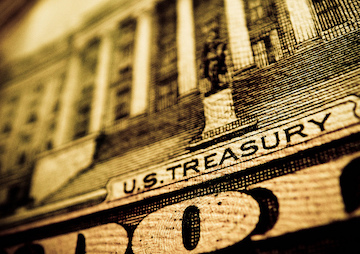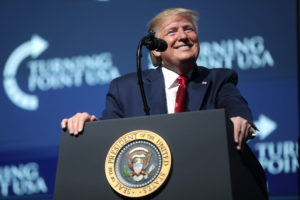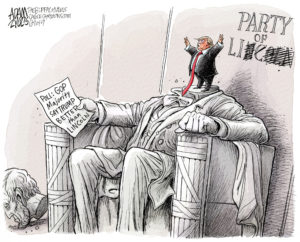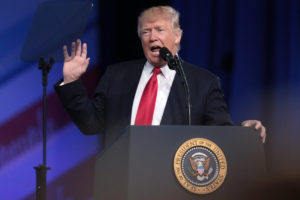‘Print the Money’: Trump’s ‘Reckless’ Proposal Echoes Franklin and Lincoln
It's been called crazy talk. But the solution of Abraham Lincoln and the American colonials may be the only sane response to a $19 trillion federal debt that has doubled over the last 10 years. Kurtis Garbutt / (CC-BY-2.0)
1
2
Kurtis Garbutt / (CC-BY-2.0)
1
2
Simply buying back federal securities with money issued by the central bank (or the U.S. Treasury) would also get money into the real economy, if Congress were allowed to increase its budget in tandem. As observed in The Economist on May 1, 2016:
Advocates of helicopter money do not really intend to throw money out of aircraft. Broadly speaking, they argue for fiscal stimulus—in the form of government spending, tax cuts or direct payments to citizens—financed with newly printed money rather than through borrowing or taxation. Quantitative easing (QE) qualifies, so long as the central bank buying the government bonds promises to hold them to maturity, with interest payments and principal remitted back to the government like most central-bank profits.
As Dean Baker, co-director of the Center for Economic and Policy Research in Washington, wrote in response to the debt ceiling crisis in November 2010:
There is no reason that the Fed can’t just buy this debt (as it is largely doing) and hold it indefinitely. If the Fed holds the debt, there is no interest burden for future taxpayers. The Fed refunds its interest earnings to the Treasury every year. Last year the Fed refunded almost $80 billion in interest to the Treasury, nearly 40 percent of the country’s net interest burden. And the Fed has other tools to ensure that the expansion of the monetary base required to purchase the debt does not lead to inflation.
An even cleaner solution would be to simply void out the debt held by the Fed. That was the 2011 proposal of then-presidential candidate Ron Paul for dealing with the debt ceiling crisis. As his proposal was explained in Time Magazine, today the Treasury pays interest on its securities to the Fed, which returns 90% of these payments to the Treasury. Despite this shell game of payments, the $1.7 trillion in US bonds owned by the Fed is still counted toward the debt ceiling. Paul’s plan:
Get the Fed and the Treasury to rip up that debt.
It’s fake debt anyway. And the Fed is legally allowed to return
the debt to the Treasury to be destroyed.
Congressman Alan Grayson, a Democrat, also endorsed this proposal.
Financial author Richard Duncan makes a strong case for going further than just monetizing existing debt. He argues that under current market conditions, the US could actually rebuild its collapsing infrastructure by just printing the money, without causing price inflation. Prices go up when demand (money) exceeds supply (goods and services); and with automation and the availability of cheap labor in vast global markets today, supply can keep up with demand for decades to come. Duncan observes:
The combination of fiat money and Globalization creates a unique moment in history where the governments of the developed economies can print money on an aggressive scale without causing inflation. They should take advantage of this once-in-history opportunity . . . .
Returning the Power to Create Money to the People
The right of government to issue its own money was one of the principles for which the American Revolution was fought. Americans are increasingly waking up to the fact that the vast majority of the money supply is no longer issued by the government but is created by private banks when they make loans; and that with that power goes enormous power over the economy itself.
The issue that should be debated is one that dominated political discussion in the 19th century but that few candidates are even aware of today: should creation and control of the money supply be public or private? Donald Trump’s willingness to transgress the conservative taboo against public money creation is a welcome step in opening that debate.
Ellen Brown is an attorney, Founder of the Public Banking Institute, and author of twelve books, including the best-selling Web of Debt. Her latest book, The Public Bank Solution, explores successful public banking models historically and globally. Her 300+ blog articles are at EllenBrown.com. She can be heard biweekly on “It’s Our Money with Ellen Brown” on PRN.FM.
Your support matters…Independent journalism is under threat and overshadowed by heavily funded mainstream media.
You can help level the playing field. Become a member.
Your tax-deductible contribution keeps us digging beneath the headlines to give you thought-provoking, investigative reporting and analysis that unearths what's really happening- without compromise.
Give today to support our courageous, independent journalists.






You need to be a supporter to comment.
There are currently no responses to this article.
Be the first to respond.